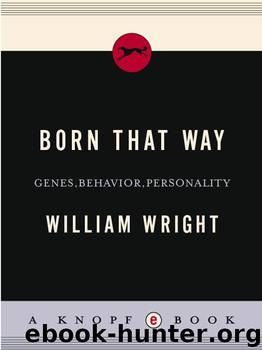Born That Way by William Wright

Author:William Wright
Language: eng
Format: mobi
ISBN: 9780307819383
Publisher: Knopf Doubleday Publishing Group
Published: 2012-05-16T04:00:00+00:00
TWELVE
THE UPS AND DOWNS OF HUMAN NATURE
THE NATURE-NURTURE DEBATE has been raging, in one form or another, as long as humans have reflected about themselves. Adam and Eve started things off by calling attention to their innate nature (good but weak), while their nemeses, the serpent and the apple tree, could be considered environmental influences—leaving only the question of whether the Garden of Eden, as a rearing environment, fell within Sandra Scarr’s “normal range.” There have been so many fluctuations in the fortunes of the biological versus the environmental positions that it was inevitable that in recent times apathy has set in among bystanders. First one side’s up, then the other; exhausted by these pendulum swings, much of the public has developed a cry-wolf indifference to the issue. That this reaction should happen now is both ironic and unfortunate in that science finally appears to have resolved the problem once and for all.
The conclusion that both sides now seem to agree on is that nature-or-nurture is a nonquestion. There was nothing wrong with the two concepts—nature, for genes and biology; nurture for the environment. There was plenty wrong, it turns out, with the “or.” The most cogent dismissal of this thinking must be that of Martin Daly and Margo Wilson, who wrote in their landmark 1988 book Homicide: “One might just as well ask whether hemoglobin or air is more essential to human survival.” This is a particular apt analogy, not only because both genes and environment are fundamental to development but also because their interaction is too.
The question, then, turns out to have been bogus, at least in the either-or form in which it was cast. Still, the longevity and virulence of the debate is surely a result of its relationship to fundamental questions on man’s nature that scientists and thinkers have grappled with throughout history. And because the conclusions about humans were so momentous, the matter has been the staked-out turf of powerful political and religious institutions whose systems were erected upon their conceptions of this essence, of human nature itself.
So the debate has not been an abstract conundrum, a pastime for medieval monks, dormitory bull sessions, or competing schools of psychology. It is a question that can determine the way in which humans are reared, governed, educated, punished—and how they see themselves in relationship to their gods, to their governments, and to one another. It is no wonder that throughout history entrenched powers, spiritual and temporal, have ferociously defended their dogmatic pronouncements on mankind’s essential nature—and many still do.
In looking over this history of fluctuating views about human personality and behavior, one of the most revealing areas is the changing beliefs about mental illness over the centuries. This specialized area might sound extraneous to discussions of normal behavior, but it is closely related, in that theories about mental illness invariably rest on theories about normal brain function. Because for much of this century, non-ill behavior was not seen as having any direct connection to our physical selves
Download
This site does not store any files on its server. We only index and link to content provided by other sites. Please contact the content providers to delete copyright contents if any and email us, we'll remove relevant links or contents immediately.
The Art of Thinking Clearly by Rolf Dobelli(10487)
Mindhunter: Inside the FBI's Elite Serial Crime Unit by John E. Douglas & Mark Olshaker(9339)
Change Your Questions, Change Your Life by Marilee Adams(7780)
Nudge - Improving Decisions about Health, Wealth, and Happiness by Thaler Sunstein(7706)
Mastermind: How to Think Like Sherlock Holmes by Maria Konnikova(7342)
The Power of Now: A Guide to Spiritual Enlightenment by Eckhart Tolle(5781)
Men In Love by Nancy Friday(5239)
Altered Sensations by David Pantalony(5103)
Factfulness: Ten Reasons We're Wrong About the World – and Why Things Are Better Than You Think by Hans Rosling(4742)
The Confidence Code by Katty Kay(4259)
Thinking in Bets by Annie Duke(4226)
Man and His Symbols by Carl Gustav Jung(4135)
The Worm at the Core by Sheldon Solomon(3486)
Why Buddhism is True by Robert Wright(3451)
Liar's Poker by Michael Lewis(3447)
Three Women by Lisa Taddeo(3433)
The Inner Life of Animals by Peter Wohlleben(3318)
Descartes' Error by Antonio Damasio(3277)
How Music Works by David Byrne(3268)
